Unit1 My Activities(4)
高中英语人教版(2019)必修第一册短文记词汇总清单

高中英语必修一短文记词Welcome Unit 我的高中第一天【选背】Tian Hua is an exchange student from China’s Lakeside Junior High School. She looks good, think fast and play hard. On campus, you’ll never see her without a book. If she’snot in class, she’s either in the library or in the computer lab. Her goal is to starther own IT company. Here is her first day at America’s South Hill Senior High School.田华是一名来自中国湖畔初中的交换生。
她长相姣好,思维敏捷,该玩时就玩个痛快。
在校园里,你会发现她总是带着书。
如果不上课,她要么在图书馆要么在计算机实验室。
她的目标是创办一家她自己的信息技术公司。
下面是她在美国南山高中的第一天。
注意:选背段落是正文的背景介绍,包含的单词表词汇(黑体加粗)在必背段落中还会复现。
【必背】This morning, I felt anxious and frightened because I am not outgoing and I'm juniorto my my new classmates from different nations. I look forward to making a good first impression on them, but what if some guys annoys me or make me awkward? What if they don’t enjoy my company and leave me alone at last?今早时,我觉得焦虑害怕,因为我不大外向,又比来自不同国家的新同学们年龄小。
外研版九年级上册Module 2 Public holidays Unit 1单元整体教学设计

外研版九年级上册Modu1e2Pub1icHo1idays大单元教学设计国的某一节日做简单的介绍,感受我国文化的底蕴,培养学生热爱国家、名族的情怀。
核心语言知识分析:本模块主要语法状语从句的用法,主要学习时间状语从句的用法,使学生能够准确表达,达到自如运用的程度。
知识储备:1 .学生对“节假日”话题并不陌生,在七年级的时候就学过关于“春节”的相关内容,也能够做简单的介绍。
本模块主要谈论世界主要国家的节假日与庆祝活动。
内容比较丰富、有趣,所以学生对话题会比较感兴趣,也很容易进行讨论。
2 .学生在八年级学习了since›when 与whi1e 的基本用法,对这些词的用法有所感知和理解。
3 .学生掌握了一些有效的阅读策略。
可能面临的问题:1 .学生对话题比较熟悉,但是单词的储备还是欠缺,很多的词汇不熟悉,比较难开展讨论,可能只会在文中找些单词来进行描述,信息获取,文化知识的内化对于学生而言有一定难度。
2 .学生可能会分不清when 与whi1e 的用法,弄不清延续性动词和非延续性动词,造成理解上的一定困难。
3 .学生信息收集整理以及有逻辑的写作输出能力有待提高。
模块内容分析(Ana1ysisof the1earning materia1s)学情分析(Ana1ysisof thestudents)I 单元主题:节假日]庆节的庆祝方式,以及从哪一年开始庆祝。
学生能够在听、读任务完成后进行简单的表述。
在学习对话之前,活动1、2的设计为学生扫清了新词障碍。
Why:本单元语篇旨在让学生初步了解中、美两国的节日。
II.教学目标(TeaChingobjectives)在本课学习结束时,学生能够:1.熟练运用文中的重点句型和日常交际用语。
2.通过听、说活动,获取和梳理四大世界奇观的基本信息。
能够简单阐述自己的观点。
II1教学重、难点(Key&dif∏cu1tpoints)1.掌握文中重点词汇和句型。
2.掌握关于停顿的听力技巧,提高听的能力。
大学英语第一册第四单元课文翻译及练习答案
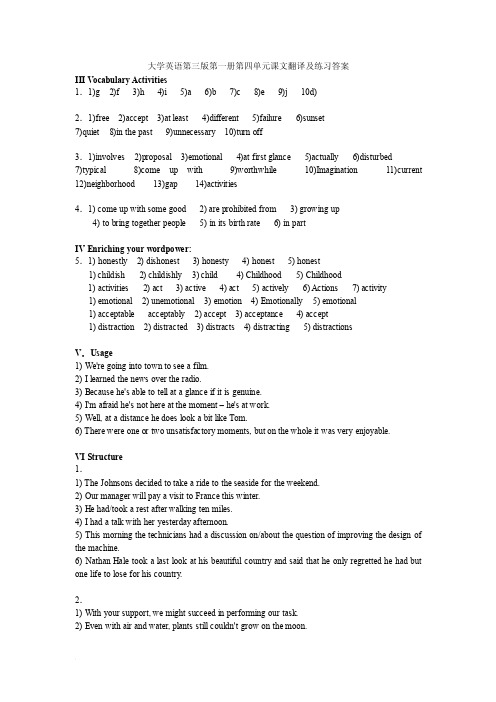
大学英语第三版第一册第四单元课文翻译及练习答案III Vocabulary Activities1.1)g 2)f 3)h 4)i 5)a 6)b 7)c 8)e 9)j 10d)2.1)free 2)accept 3)at least 4)different 5)failure 6)sunset7)quiet 8)in the past 9)unnecessary 10)turn off3.1)involves 2)proposal 3)emotional 4)at first glance 5)actually 6)disturbed7)typical 8)come up with 9)worthwhile 10)Imagination 11)current 12)neighborhood 13)gap 14)activities4.1) come up with some good 2) are prohibited from 3) growing up4) to bring together people 5) in its birth rate 6) in partIV Enriching your wordpower:5.1) honestly 2) dishonest 3) honesty 4) honest 5) honest1) childish 2) childishly 3) child 4) Childhood 5) Childhood1) activities 2) act 3) active 4) act 5) actively 6) Actions 7) activity1) emotional 2) unemotional 3) emotion 4) Emotionally 5) emotional1) acceptable acceptably 2) accept 3) acceptance 4) accept1) distraction 2) distracted 3) distracts 4) distracting 5) distractionsV.Usage1) We're going into town to see a film.2) I learned the news over the radio.3) Because he's able to tell at a glance if it is genuine.4) I'm afraid he's not here at the moment – he's at work.5) Well, at a distance he does look a bit like Tom.6) There were one or two unsatisfactory moments, but on the whole it was very enjoyable.VI Structure1.1) The Johnsons decided to take a ride to the seaside for the weekend.2) Our manager will pay a visit to France this winter.3) He had/took a rest after walking ten miles.4) I had a talk with her yesterday afternoon.5) This morning the technicians had a discussion on/about the question of improving the design of the machine.6) Nathan Hale took a last look at his beautiful country and said that he only regretted he had but one life to lose for his country.2.1) With your support, we might succeed in performing our task.2) Even with air and water, plants still couldn't grow on the moon.3) Without hard work / Without working hard, you will accomplish nothing.4) Without their assistance, he would have found himself in trouble.5) It has been (is) about four and a half years since the Wangs settled down in this country.6) It has been (is) less than three months since she joined the Y outh League.7) It has been (is) 20 years since I got to know her in Beijing.8) It has been (is) over a century since the railway was completed.3.1) He proposed that we (should) put on a short play at the English evening.2) I suggest that he (should) visit the Great Wall, the Summer Palace, etc.3) He proposed that the novel (should) be made into a film.4) My proposal is that the dispute (should) be settled by peaceful means.VII Cloze1.1) proposed 2) prohibited 3) social 4) actually 5) rate6) bringing together 7) proposal 8) worthwhile 9) involve2.A1)fun 2)turn 3)in 4)different/interesting 5)make 6)will 7)by/from 8)latest9)and 10)in 11)watch 12)or 13)in 14)to 15)there 16)for 17)may 18)home19)reasonsB1)but 2)used 3)little/bit 4)few 5)little 6)number 7)some 8)while9)any 10)deal 11)no 12)nowVIII.Spot Dictation1) gathered 2) in the habit of 3) on the radio 4) on television 5) comfortably6) trouble 7) art 8) more and more 9) problems 10) however perfectlyIX.T ranslation1) 接受这份工作就得经常在周末上班,但约翰并不在意。
(含答案+听力材料)Unit 4 After-School Activities 综合素质评价
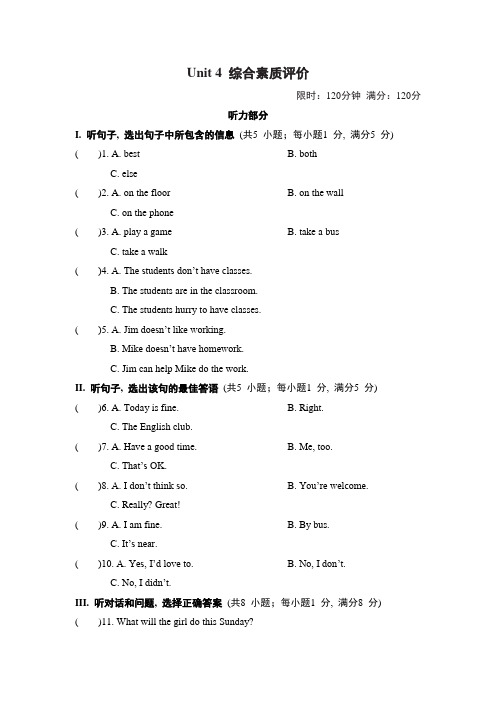
Unit 4 综合素质评价限时:120分钟满分:120分听力部分I. 听句子, 选出句子中所包含的信息(共5 小题;每小题1 分, 满分5 分)()1. A. best B. bothC. else()2. A. on the floor B. on the wallC. on the phone()3. A. play a game B. take a busC. take a walk()4. A. The students don’t have cl asses.B. The students are in the classroom.C. The students hurry to have classes.()5. A. Jim doesn’t like working.B. Mike doesn’t have homework.C. Jim can help Mike do the work.II. 听句子, 选出该句的最佳答语(共5 小题;每小题1 分, 满分5 分)()6. A. Today is fine. B. Right.C. The English club.()7. A. Have a good time. B. Me, too.C. That’s OK.()8. A. I don’t think so. B. You’re welcome.C. Really? Great!()9. A. I am fine. B. By bus.C. It’s near.()10. A. Yes, I’d love to. B. No, I don’t.C. No, I didn’t.III. 听对话和问题, 选择正确答案(共8 小题;每小题1 分, 满分8 分)()11. What will the girl do this Sunday?A. B. C.()12. Which club are the boys in?A. B. C.()13. When will they leave?A. On Saturday afternoon.B. On Saturday morning.C. On Sunday morning.()14. How far is it from their city to Beijing?A. About 340 kilometres.B. About 540 kilometres.C. About 430 kilometres.()15. How will they go there?A. By train.B. By bus.C. By plane. ()16. When is the music festival?A. On May 21st.B. On May 22nd.C. On May 23rd. ()17. What can Mark do?A. Play the piano.B. Sing.C. Dance.()18. How will they go there?A. Walk.B. Take a bus.C. Ride a bike. IV. 听短文和问题, 选择正确答案(共7 小题;每小题1 分, 满分7 分) ()19. What are children’s favourite pl aces?A. Tree houses.B. The parks.C. The rivers. ()20. How many tables are there in the tree house?A. One.B. Two.C. Three.()21. What does Betty’s father do?A. A teacher.B. A singer.C. A worker.()22. What do Betty’s parents always do o n weekends?A. They play sports.B. They listen to music.C. They cook nice food.()23. Who does Betty often do homework with?A. Her sister.B. Her friends.C. Her classmates. ()24. What doesn’t Betty like?A. Music.B. Sports.C. Reading.()25. How does Betty feel after doing sports?A. Happy.B. Excited.C. Tired.V. 听短文填空(共5 小题;每小题1 分, 满分5 分)笔试部分VI. 单项选择(共10 小题;每小题1 分, 满分10 分)选出可以填入空白处的最佳选项。
大学英语(一)Unit1课文译文和练习
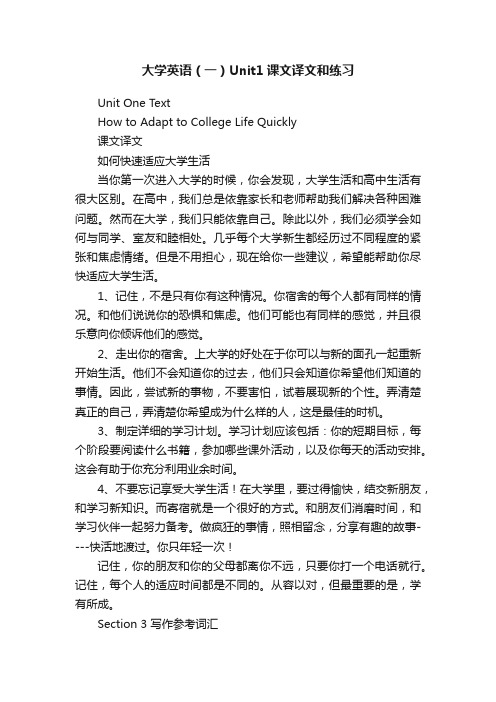
大学英语(一)Unit1课文译文和练习Unit One TextHow to Adapt to College Life Quickly课文译文如何快速适应大学生活当你第一次进入大学的时候,你会发现,大学生活和高中生活有很大区别。
在高中,我们总是依靠家长和老师帮助我们解决各种困难问题。
然而在大学,我们只能依靠自己。
除此以外,我们必须学会如何与同学、室友和睦相处。
几乎每个大学新生都经历过不同程度的紧张和焦虑情绪。
但是不用担心,现在给你一些建议,希望能帮助你尽快适应大学生活。
1、记住,不是只有你有这种情况。
你宿舍的每个人都有同样的情况。
和他们说说你的恐惧和焦虑。
他们可能也有同样的感觉,并且很乐意向你倾诉他们的感觉。
2、走出你的宿舍。
上大学的好处在于你可以与新的面孔一起重新开始生活。
他们不会知道你的过去,他们只会知道你希望他们知道的事情。
因此,尝试新的事物,不要害怕,试着展现新的个性。
弄清楚真正的自己,弄清楚你希望成为什么样的人,这是最佳的时机。
3、制定详细的学习计划。
学习计划应该包括:你的短期目标,每个阶段要阅读什么书籍,参加哪些课外活动,以及你每天的活动安排。
这会有助于你充分利用业余时间。
4、不要忘记享受大学生活!在大学里,要过得愉快,结交新朋友,和学习新知识。
而寄宿就是一个很好的方式。
和朋友们消磨时间,和学习伙伴一起努力备考。
做疯狂的事情,照相留念,分享有趣的故事----快活地渡过。
你只年轻一次!记住,你的朋友和你的父母都离你不远,只要你打一个电话就行。
记住,每个人的适应时间都是不同的。
从容以对,但最重要的是,学有所成。
Section 3 写作参考词汇faculty 学院department 系/部,institute 学院/研究院campus 校园,laboratory/lab 实验室auditorium 会堂/礼堂, gymnasium 体育馆/健身室information desk 咨询处library 图书馆art center 艺术中心clinic 医务室laundry room 洗衣室dining hall 食堂common room 公共休息室Administration Office 管理办公室computer center 计算机网络中心Student Accommodation Center 学生住宿管理中心audio-visual resource center 音像资料中心Law School 法学院Medical School 医学院Business School 商学院Faculty of EnglishLanguage and Culture英语语言文化学院Faculty of ElectronicEngineering电子工程学院Chemistry Department 化学系Faculty of Social Studies 社会学学院Mathematics Department 数学系Physics Department 物理系Physical Science Department自然科学系Management Institute管理学院Education Institute 教育学院Students’ Union学生会society社团registration form注册表membership application会员资格申请Recreation Center娱乐室Sports Hall 体育馆Activity Room 活动室playing fields 比赛场地tennis court 网球场football field 足球场volleyball 排球badminton 羽毛球racket 球拍Task 3 Give brief answers to the following questions. (p4)1. How do students solve all kinds of difficult problems at college?Students have to rely on themselves.2. How do most college freshmen feel when they first enter college?They experience some level of nervousness and anxiety.3. What does a detailed study plan usually include?It should include a student’s short-term goals, what books to read at a certain stage, what extra curriculum activities to participate in and daily activities.4. What is college about according to the passage?College is about having fun and making new friends as well as learning new knowledge.5. What could new students do when they are in need of help to adjust to the new environment?Just give a phone call to their friends and parents who are always ready to help.6. How do you adapt to your college life?OpenTask 6 Read the English sentences and translate the Chinesesentences into English.( P6)1. What's more, we should learn to live independently.What's more, we lack necessary experience.2. Chances are that man will eventually land on Mars.Chances are that Grace will not come to the meeting.3. For this reason, many of his former friends turned against him.For this reason, I have decided to take teaching as my future career.4. This is a great time not only to learn new knowledge but also to developourselves in all aspects.This is a great time not only to relax oneself but also to experience new things.5. Reading English aloud in the morning will do you a lot of good.Cheating in an exam ruins one's personality.Section 4 Activity 2 Task 1 (p14)1) This is my friend Mary. She is a student at Binhai Technical School.这是我们的新老师史密斯先生,他来自澳大利亚。
人教版英语四年级上册unit1 My day-课件

”二
,分
我管
们教
一,
起八
,分
静放
待手
花;
开二
。分
成
➢ Pure of heart, life is full of sweet and
绩 ,
joy!
八 分
方
法
。
愿
全
天
下
所
有
父
母
我们,还在路上……
I go home at 4:30 p.m.
When do you eat dinner?
5:30
I eat dinner at 5:30 p.m.
When do you watch TV?
7:00
I watch TV at 7:00 p.m.
When do you go to bed?
9:00
go to bed: ______
What do you do at the weekend?
I usually play football.
What do you do at the weekend,?
I ususally play football.
What do you do on the weekend?
What do you do at the weekend?
play football
I usually________. Clean my room
play basketball
watch TV
go swimming
go fishing
sleep
ride bikes
Let’s practice
When do you get up every day?
(人教版)2024新版英语七年级上册Unit 1-Unit4单词讲解

1.make friends交朋友make friends with me和我交朋友2.get to know 认识;了解I got to know her last week.3.each /i:tʃ/adj.&pron.每个;各自each of them; each picture4.other /'ʌðə(r)/pron.另外的人(或物) Some pictures are better than others. adj.另外的;其他的Are there any other questions?each other 互相;彼此help each other; learn from each other5.full/fʊl/adj 完整的;满的 a full story; a cup full of waterfull name 全名Please write down your full name.6.grade /greɪd/ n年级;等级He is in Grade 2.=He is in the second grade.st name姓氏first name名字You can call him Jim Green. His first name is jim and last name is “Green”.8.classmate/kla:smeit/n.同班同学Jack and Lily are classmates.9.class teacher 班主任---Who is your class teacher? ---Miss Li.10.mistake /mɪ'steɪk/n错误;失误Everyone makes mistakes.11.country/'kʌntri/n.国家China is one of the best countries.12.same/seim/adj.相同的in the same class, look the samethe same as...与...一样;be different from与....不同13.twin/twin/n双胞胎之一adj.双胞胎之一的twin boys/girls14.both /bəʊθ/adj.& pron.两个;两个都Both of my parents are workers.Lucy and Lily are both good students.15.band/bænd/n.乐队I like the jazz band.16.pot/pɒt/n.锅Is there any tea in the pot? A coffee pot is on the table.17.a lot很;非常tofu /toufu:/ n.豆腐Does Jack like tofu a lot? Yes, he does.18.parrot/pærət/n.鹦The parrot can repeat(重复) my words.19.guitar /ɡɪ'ta:(r)/n.吉他I like playing the guitar.20.tennis /tenis/n.网球Does he often play tennis?21.post /pəʊst/n.帖子;邮政邮;发布22.even /i:vn/adv 甚至;连;愈加23.hey /hei/interj.嘿;喂24.would /wud;wod/ modalv 想(用于礼貌地邀请或向某人提供某物);将会would('d)like to 表示愿意喜欢I would like to visit my grandparents.rmation /ɪnfəˈmeɪʃən/ n.信息;消息much information(不可数名词)26.hobby /ˈhɒbi/n业余爱好Playing tennis is ine of my hobbies.27.Green/gri:n/格林UK/ju:'kei/英国US/ju:'es/美国Smith/smɪθ/史密斯Both Green and Smith like the UK and the US28.人名:Lisa /li:zə/ 莉萨Tom/tɒm/汤姆Sally /ˈsæli/ 萨莉Wood /wud/伍德Pauline /ˈpɔ:li:n/保利娜Lee /li:/李29.Sydney/ˈsɪdni/悉尼(澳大利亚城市) She comes from Sydney.30.Australia /ɒ'streɪliə/澳大利亚an Australian city一座澳大利亚的城市31.hotpot 火锅Mapo tofu 麻婆豆腐Beijing roast /rəʊst/ duck北京烤鸭32.Singapore /ˌsɪŋəˈpɔ:(r)/新加坡Coco /'kəʊkəʊ/ 科科Coco takes the train to Singapore.33.London /ˈlʌndən/伦敦(英国首都)1.mean v意思是;打算means/meant/meaningWhat does the word mean?这个单词什么意思?What does she mean by doing that? 她那样做什么意思?2.husband n.丈夫husband and wife夫妇3.bat n.球棒;球拍two ping-pong bats乒乓球拍4.play ping-pong打乒乓球= play table tennis5.every day 每天---How often do you watch TV, Mr.Li ? ---Every day.Everyday adj. 每天的everyday life日常生活6.together adv在一起;共同We study together every day.7.fishing rod 钓竿My father uses a fishing rod to fish.8.spend v花(时间钱等) a lot of/lots of大量;许多The boy in red often apends lots of time playing ping-pong.9.really adv 非常;确实;真正地(可修饰形容词,副词或动词)The book is really interesting.They are really my aunt and uncle.Your mother really loves you.10.activity n.活动do after-school/classroom activities11.chess n.国际象棋Chinese chess 中国象棋(球类和棋类钱不加the,乐器前加the)He plays Chinese chess and plays the piano as hobbies.他下中国象棋和弹钢琴作为爱好。
人教版八年级上册英语Unit1 单元测试卷(含答案)精选全文
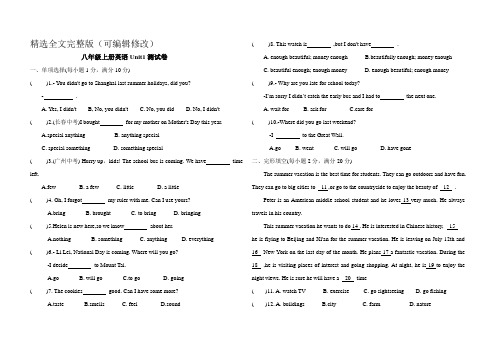
精选全文完整版(可编辑修改)八年级上册英语Unit1测试卷一、单项选择(每小题1分,满分10分)( )1.- You didn't go to Shanghai last summer holidays, did you?- .A. Yes, I didn't B, No, you didn't C. No, you did D. No, I didn't( )2.(长春中考)I bought for my mother on Mother's Day this year.A.special anythingB. anything specialC. special somethingD. something special( )3.(广州中考) Hurry up,kids! The school bus is coming. We have time left.A.fewB. a fewC. littleD. a little( )4. Oh, I forgot my ruler with me. Can I use yours?A.bringB. broughtC. to bringD. bringing( )5.Helen is new here,so we know about her.A.nothingB. somethingC. anythingD. everything( )6.- Li Lei, National Day is coming. Where will you go?-I decide to Mount Tai.A.goB. will goC.to goD. going( )7. The cookies good. Can I have some more?A.tasteB.smellsC. feelD.sound ( )8. This watch is ,but I don't have .A. enough beautiful; money enoughB.beautifully enough; money enoughC. beautiful enough; enough moneyD. enough beautiful; enough money ( )9.- Why are you late for school today?-I’m sorry I didn’t catch the early bus and I had to the next one.A. wait forB. ask forC.care for( )10.-Where did you go last weekend?-I to the Great Wall.A.goB. wentC. will goD. have gone二、完形填空(每小题2分,满分20分)The summer vacation is the best time for students. They can go outdoors and have fun. They can go to big cities to 11 ,or go to the countryside to enjoy the beauty of 12 .Peter is an American middle school student and he loves 13 very much. He always travels in his country.This summer vacation he wants to do 14 . He is interested in Chinese history, 15he is flying to Beijing and Xi'an for the summer vacation. He is leaving on July 12th and 16 New York on the last day of the month. He plans 17 a fantastic vacation. During the 18 ,he is visiting places of interest and going shopping. At night, he is 19 to enjoy the night views. He is sure he will have a 20 time( )11. A. watch TV B. exercise C. go sightseeing D. go fishing( )12. A. buildings B.city C. farm D. nature( )13. A. travelling B. shopping C. fishing D. hiking( )14. A. something difference B. different somethingC. something differentD. difference something( )15. A. because B.so C. but D.although( )16. A. getting back to B.get backC. getting hackD. gets back to( )17. A. having B. to have C. to having D. had( )18. A. weekend B. week C.night D. day( )19. A. take a walk B. taking walks C. takes a walk D. take walks( )20. A. great B. well C.terrible D. boring三、阅读理解(每小题2分,分20分)AWhat do we do when we go camping? First, we make n plan. We take food, clothing, a knife, and things for cooking and eating. We take things to keep us away from insects and the sun.Then we put everything into the car and we drive to the woods. We look for a place for campers (露营者) and we look for a good place for our tent(帐篷). The place should have a lot of moving air.This will keep some insects away. High land with water on both sides of it is good. Then we put up our tent. We put everything into the tent,and we are ready for fun. We can swim in the lake, walk in the woods, climb a mountain, row a boat, or go fishing.In the evening we come back to the tent, and we build a big fire because it can keep the insects away. We sit around the fire and talk. We may tell interesting stories or we may sing songs.At night we lie down on the grass. We can look up at the stars. It is a busy day, so we try to go to sleep early.Everything is dark. Everything is quiet. We hope we won’t hear music from the radio in the next tent. We hope it won’t rain.( )21. Before going camping we should first .A. make a planB. take some foodC.take things to keep us warmD. lake something for cooking and eating ( )22. We go to camp .A.by busB. by carC. by bikeD. on foot( )23. Campers can take part in activities.A. one or twoB. only a fewC.manyD. two or three( )24. In the evening we build a fire because .A. it is cold at nightB. it can keep us warmC. it can keep the insects awayD. it is dark and quiet( )25. Campers like to at night.A. hear music from the radioB. go to sleep earlyC. have rainD. be busyBThe westerners have more vacation days than us.Some people like to stay at home during their vacation. They work in the garden, visit their friends read books or watch television. Many families take their lunch to a park or somewhere far from the city. They like to eat under some trees or near a nice lake. If they live near the sea. They often go to the seaside. There they can fish, swim or enjoy the sun.The westerners like travelling. They think travelling and outdoor activities are the parts of their lives. They work hard to save money, but their main purpose(目的) is to travel.Most western students often make use of their vacation to camp. There are thousands of camp bases(基地)in western countries. They can swim, go fishing, attend lectures, and take part in many other recreational (娱乐性的) activities there. It can help them wrest from the secrets of nature,train(训练) their viability(生存能力),and teach them how to be self-reliant(自立).( )26. Some westerners like to at home during their vacation.A. clean their roomsB. cook their mealsC. work in the garden and watch TVD. go fishing( )27. Many families often take their lunch out and have it .A. under some treesB. near the cityC. near the houseD. in the restaurants(餐馆)( )28. is very important for the westerners.A. Working hardB. TravellingC. Saving moneyD.Going camping ( )29. What does the underlined phrase "wrest from"mean here?A.取得B.保守C.认识D.探索( ) 30.The passage mainly tells us .A.how the westerners spend their vacationB. the westerners have more vacation days than usC. different views on vacation between the westerners and the easternersD. how to be self-reliant四、词语运用(每小题1分,满分10分)根据语篇内容,用方框中所给词的正确形式填空,使短文通顺、连质。
Unit1词汇讲解---2024年高考英语一轮复习夯实基础(北师大版2019)
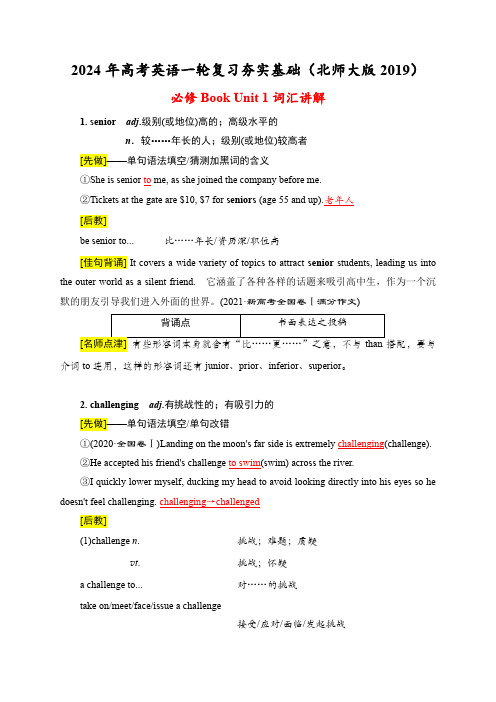
2024年高考英语一轮复习夯实基础(北师大版2019)必修Book Unit 1词汇讲解1. senior adj.级别(或地位)高的;高级水平的n.较……年长的人;级别(或地位)较高者[先做]——单句语法填空/猜测加黑词的含义①She is senior to me, as she joined the company before me.②Tickets at the gate are $10, $7 for seniors (age 55 and up).老年人[后教]be senior to...比……年长/资历深/职位高[佳句背诵] It covers a wide variety of topics to attract senior students, leading us into the outer world as a silent friend.它涵盖了各种各样的话题来吸引高中生,作为一个沉默的朋友引导我们进入外面的世界。
(2021·新高考全国卷Ⅰ满分作文)介词to连用,这样的形容词还有junior、prior、inferior、superior。
2. challenging adj.有挑战性的;有吸引力的[先做]——单句语法填空/单句改错①(2020·全国卷Ⅰ)Landing on the moon's far side is extremely challenging(challenge).②He accepted his friend's challenge to swim(swim) across the river.③I quickly lower myself, ducking my head to avoid looking directly into his eyes so he doesn't feel challenging. challenging→challenged[后教](1)challenge n.挑战;难题;质疑v t. 挑战;怀疑a challenge to... 对……的挑战take on/meet/face/issue a challenge接受/应对/面临/发起挑战challenge sb. to (do) sth.向某人挑战(做)某事/要求某人做某事(2)challenged adj. 受到挑战的[佳句背诵] Many Chinese brands, having developed their reputations over centuries, are facing new challenges from the modern market.很多享誉数百年的中国品牌现在正面临着现代市场带来的新挑战。
五年级上册英语教案(含作业设计和反思)-Module 4 Unit 1 Period 1外研版三起
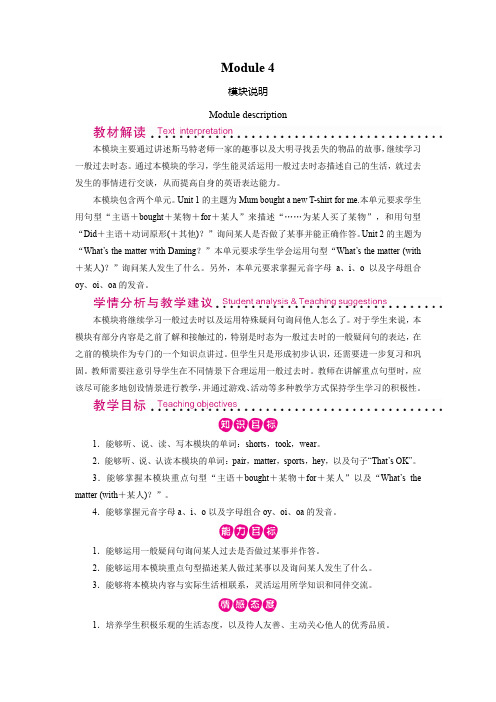
Module 4模块说明Module description本模块主要通过讲述斯马特老师一家的趣事以及大明寻找丢失的物品的故事,继续学习一般过去时态。
通过本模块的学习,学生能灵活运用一般过去时态描述自己的生活,就过去发生的事情进行交谈,从而提高自身的英语表达能力。
本模块包含两个单元。
Unit 1的主题为Mum bought a new Tshirt for me.本单元要求学生用句型“主语+bought+某物+for+某人”来描述“……为某人买了某物”,和用句型“Did+主语+动词原形(+其他)?”询问某人是否做了某事并能正确作答。
Unit 2的主题为“What’s the matter with Daming?”本单元要求学生学会运用句型“What’s the matter (with +某人)?”询问某人发生了什么。
另外,本单元要求掌握元音字母a、i、o以及字母组合oy、oi、oa的发音。
本模块将继续学习一般过去时以及运用特殊疑问句询问他人怎么了。
对于学生来说,本模块有部分内容是之前了解和接触过的,特别是时态为一般过去时的一般疑问句的表达,在之前的模块作为专门的一个知识点讲过。
但学生只是形成初步认识,还需要进一步复习和巩固。
教师需要注意引导学生在不同情景下合理运用一般过去时。
教师在讲解重点句型时,应该尽可能多地创设情景进行教学,并通过游戏、活动等多种教学方式保持学生学习的积极性。
1.能够听、说、读、写本模块的单词:shorts,took,wear。
2.能够听、说、认读本模块的单词:pair,matter,sports,hey,以及句子“That’s OK”。
3.能够掌握本模块重点句型“主语+bought+某物+for+某人”以及“What’s the matter (with+某人)?”。
4.能够掌握元音字母a、i、o以及字母组合oy、oi、oa的发音。
1.能够运用一般疑问句询问某人过去是否做过某事并作答。
Unit 1 单元复习课件-2022-2023学年高中英语人教版(2019)选择性必修第二册

vital than ever. 3.This morning, several classmates and I subscribed to the idea that we went
[练透] 单句语法填空 ①He planned to learn kung fu in the summer holidays so that he can defend himself against being attacked (attack). ②Cooper wrote to the journal immediately, defending (defend) himself. [写美] 一句多译 ③看到那条凶猛的蛇,他像箭一样冲过去保护他的儿子。 →Seeing the fierce snake, he rushed to defend his son like an arrow.(defend) →Seeing the fierce snake, he rushed in defence of his son like an arrow.(defence)
助;协助 10. gifted adj.有天赋的;有天才的;天资聪慧的→ gift n.天赋;天分
11. steady adj.稳定的;平稳的;稳步的→ steadily adv.平稳地;持续地 12. vivid adj.生动的;鲜明的;丰富的→ vividly adv.生动地
四、重点短语——明搭配
少) in numbers every year. 5.More than forty outstanding (杰出的) young singers from eight countries have
unit1leisureactivities新编大学英语第二版第四册课文翻译
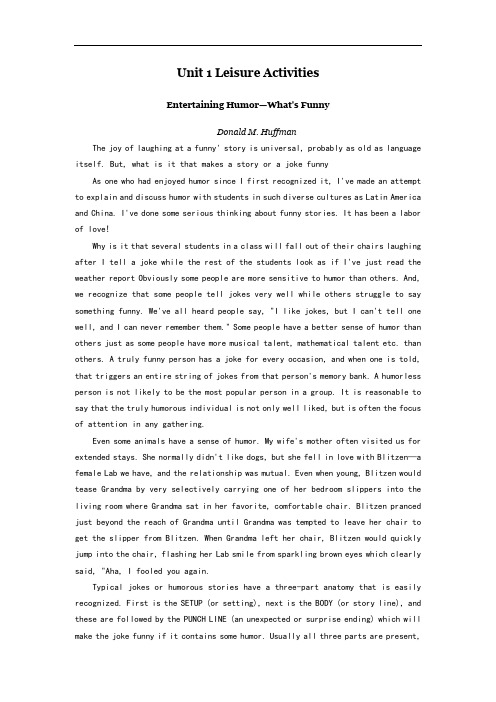
Unit 1 Leisure ActivitiesEntertaining Humor—What's FunnyDonald M. HuffmanThe joy of laughing at a funny' story is universal, probably as old as language itself. But, what is it that makes a story or a joke funnyAs one who had enjoyed humor since I first recognized it, I've made an attempt to explain and discuss humor with students in such diverse cultures as Latin America and China. I've done some serious thinking about funny stories. It has been a labor of love!Why is it that several students in a class will fall out of their chairs laughing after I tell a joke while the rest of the students look as if I've just read the weather report Obviously some people are more sensitive to humor than others. And, we recognize that some people tell jokes very well while others struggle to say something funny. We've all heard people say, "I like jokes, but I can't tell one well, and I can never remember them." Some people have a better sense of humor than others just as some people have more musical talent, mathematical talent etc. than others. A truly funny person has a joke for every occasion, and when one is told, that triggers an entire string of jokes from that person's memory bank. A humorless person is not likely to be the most popular person in a group. It is reasonable to say that the truly humorous individual is not only well liked, but is often the focus of attention in any gathering.Even some animals have a sense of humor. My wife's mother often visited us for extended stays. She normally didn't like dogs, but she fell in love with Blitzen—a female Lab we have, and the relationship was mutual. Even when young, Blitzen would tease Grandma by very selectively carrying one of her bedroom slippers into the living room where Grandma sat in her favorite, comfortable chair. Blitzen pranced just beyond the reach of Grandma until Grandma was tempted to leave her chair to get the slipper from Blitzen. When Grandma left her chair, Blitzen would quickly jump into the chair, flashing her Lab smile from sparkling brown eyes which clearly said, "Aha, I fooled you again.Typical jokes or humorous stories have a three-part anatomy that is easily recognized. First is the SETUP (or setting), next is the BODY (or story line), and these are followed by the PUNCH LINE (an unexpected or surprise ending) which will make the joke funny if it contains some humor. Usually all three parts are present,and each must be clearly presented. It helps if the story/ joke teller uses gestures and language which are well known to the audience.Humor, as a form of entertainment, can be analyzed in order to discover what makes a funny story or joke seem funny. Here, for example, are some of the most common types of humor. They range from the most obvious humor to the more subtle types."SLAP-STICK" is the most obvious humor. Its language is simple, direct, and often makes fun of another person or group. Slap-stick was and is the technique of the stand-up comedian and the clown. It appeals to all ages and all cultures. Nearly every English-speaking comedian in this century has used the following joke in one form or another. One man asks another, "Who was that lady I saw you with last night" The other replies, "That was no lady, that was my wife." The humor lies in the fact that the second man is saying that his wife is not a lady. In other words, she is not a refined woman. The joke is no less funny because it is so often used. The audience knows in advance what will be said, because it is classic humor, and any audience values it even more because of its familiarity.Chinese "cross-talk" is a special type of slap-stick in which two Chinese comedians humorously discuss topics such as bureaucrats, family problems, or other personal topics. Cross-talk can be heard anywhere from small village stages to the largest Beijing theatres, and to radio and television. It is clearly a traditional form of humor well understood by Chinese people.A PLAY ON WORDS is not so obvious as slap-stick, but it is funny because of misused or misunderstood language. My favorite example is the story of three elderly gentlemen traveling by train in England. As the train slowed for a stop the first man asked, "Is this Wembley" "No," said the second, "It's Thursday." "So am I," said the third man. "Let's stop for a beer." We know that older people often do not hear things clearly, so the misunderstanding of both Wednesday (for Wembley) and thirsty (for Thursday) make a nice setup for the punch line delivered by the third man.The famous Chinese cartoonist and humorist Ding Cong is a master of word play. In one of his funny cartoons, a teacher says, "How come you completely copied somebody else's homework" The young student replies, "I didn't completely copy it. My name on the page is different." In another classic Ding Cong cartoon, an irritated father asks, "Tell me, what's one plus two" The son says, "I don't know." The impatient father then says, "For example, you, your mother, and I altogether are how many, you idiot" The son proudly answers, "Three idiots." Whether these stories are cartoons, jokes told by a slapstick comedian, or a cross-talking team, they appealto people everywhere as funny stories because they have a note of reality to them, and the unexpected punch line is quite funny. 11 PUNS are even more subtle forms of word play. They use the technique of similar sounding words or alternative meanings of the same word. Puns are thought by some critics to be the lowest form of humor, but I disagree with this. Puns require more subtle and sophisticated language skills than most humor forms, but even the very young can use them in their simpler forms. For example, the "riddle" or trick question often uses a pun in the setup, the story line, or, more often, the punch line. Puns are the first type of humor I learned, and at about 5 years of age I remember hearing the following riddle. One person asks, "What is black and white and red all over" The other person usually cannot answer the riddle, so says, "I give up. What is the answer" The riddler replies, "A newspaper." This is the obvious answer if one knows that "red" is pronounced the same as "read" in English, but the meanings are clearly different.DOUBLE-ENTENDRES (French for double meanings) are special variations of puns in which words or phrases have double meanings. Frequently the two meanings are very different, and one is quite proper while the second is often, but not always, vulgar.I like the somewhat mild story of a school teacher and a principal of a high school who are concerned because some boys and girls have been seen kissing on the school playground. The teacher says to the students, "The principal and I have decided to stop kissing on the school playground." Hearing some laughter, she senses her message was not altogether clear, so she adds, "What I mean to say is that there will be no more kissing going on under our noses". This clarification, of course, does nothing to correct the first statement and the double meaning of the joke becomes even more laughable.Some professional humorists think too much of today's humor is not very intelligent or sophisticated. They dislike the suggestive or vulgar language used too frequently, and they feel that most humorists are not very creative. It is true that some of today's humor is rather shocking, but I don't think humor is to be blamed for that. Humor is alive and well, and it will persist simply because there are funny things happening every day. Some humorous people see and hear these funny things and are able to make them into funny, entertaining jokes and stories.享受幽默——什么东西令人开怀1 听了一个有趣的故事会发笑、很开心,古今中外都一样。
必修一 Unit1 Teenage life课本基础知识测验(含答案)
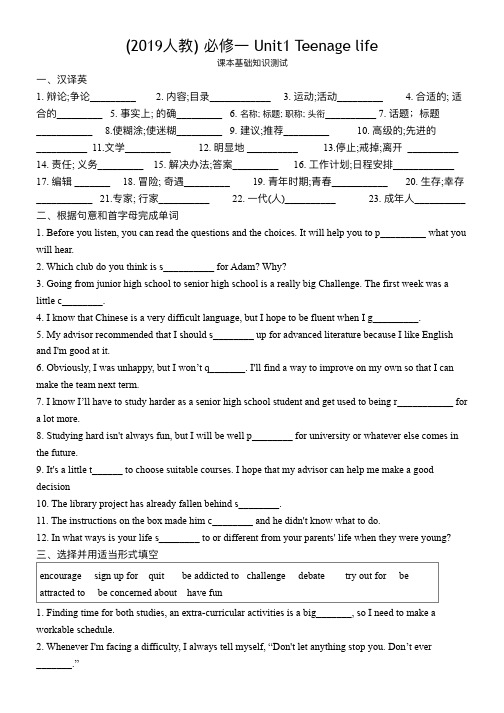
(2019⼈人教) 必修⼀一 Unit1 T eenage life课本基础知识测试⼀一、汉译英1. 辩论;争论_________2. 内容;⽬目录____________3. 运动;活动_________4. 合适的; 适合的_________5. 事实上; 的确_________6. 名称; 标题; 职称; 头衔__________7. 话题;标题___________ 8.使糊涂;使迷糊_________ 9. 建议;推荐_________ 10. ⾼高级的;先进的__________ 11.⽂文学_________ 12. 明显地 __________ 13.停⽌止;戒掉;离开 __________ 14. 责任; 义务_________ 15. 解决办法;答案_________ 16. ⼯工作计划;⽇日程安排____________ 17. 编辑 _______ 18. 冒险; 奇遇_________ 19. ⻘青年年时期;⻘青春___________ 20. ⽣生存;幸存___________ 21.专家; ⾏行行家__________ 22. ⼀一代(⼈人)__________ 23. 成年年⼈人__________ ⼆二、根据句句意和⾸首字⺟母完成单词1. Before you listen, you can read the questions and the choices. It will help you to p_________ what you will hear.2. Which club do you think is s__________ for Adam? Why?3. Going from junior high school to senior high school is a really big Challenge. The first week was alittle c________.4. I know that Chinese is a very difficult language, but I hope to be fluent when I g_________.5. My advisor recommended that I should s________ up for advanced literature because I like English and I'm good at it.6. Obviously, I was unhappy, but I won’t q_______. I'll find a way to improve on my own so that I can make the team next term.7. I know I’ll have to study harder as a senior high school student and get used to being r___________ fora lot more.8. Studying hard isn't always fun, but I will be well p________ for university or whatever else comes in the future.9. It's a little t______ to choose suitable courses. I hope that my advisor can help me make a good decision10. The library project has already fallen behind s________.11. The instructions on the box made him c________ and he didn't know what to do.12. In what ways is your life s________ to or different from your parents' life when they were young?三、选择并⽤用适当形式填空encourage sign up for quit be addicted to challenge debate try out for beattracted to be concerned about have fun1. Finding time for both studies, an extra-curricular activities is a big_______, so I need to make a workable schedule.2. Whenever I'm facing a difficulty, I always tell myself, “Don't let anything stop you. Don’t ever_______.”3. Recently there has been a strong movement around the country ___________ people to quit smoking.4. Do you want to _________ and learn at the same time? Then come to our camp.5. I've always wanted to be a cheerleader. Yesterday I _____________ the team.6. You don't have to ___________ getting low grades at the end of the term if you try your best now.7. Many teenagers today_____________ online games, but they should manage their time so that they won't____________ those games.8. Many students like to _________interesting topics with their classmates, but feel awkward or uncomfortable when they have to give a speech in class.9. Nearly half of the teenagers think that their schedules are too busy. They wish they had not____________ so many courses and extra-curricular activities.四、语法填空:阅读下⾯面材料料,在空⽩白处填⼊入适当的内容(1个单词)或括号内单词的正确形式。
人教版高中英语必修4unit1课文知识点详解
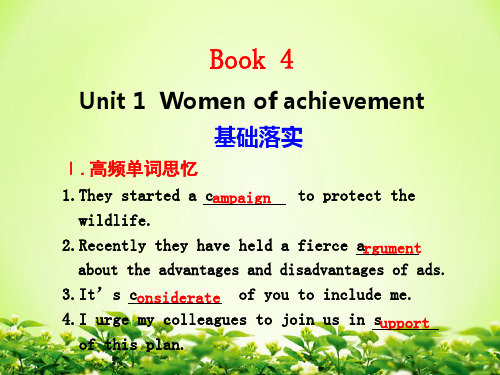
observe an anniversary庆祝周年纪念日 observer n.观察者;观测者;遵守者 observation n.观测,监测,观察,观察力 under observation在观察中;在监视中 即学即用 Though having lived abroad for years,many Chinese still __C__ the traditional customs. A.perform B.possess C.observe D.support 解析 observe在此句中意为“遵守,奉行(法律、协 议或习俗等)”。句意为:尽管在国外居住了这么多 年,许多中国人仍然遵循着传统的风俗习惯。
乐),while we ate and drank under the stars. 10.Mind your _b_e_h_a_v_i_o_r_(举止)!It’s bad
manners to do like that.
Ⅱ.重点短语再现
1._m_o_v_e__o_f_f_ 离开;起程 2._l_e_a_d__a_._._._l_i_f_e_ 过着……的生活 3._c_r_o_w_d__i_n_(想法、问题等)涌上心头 4._l_o_o_k__d_o_w_n__u_p_o_n_/_o_n_ 蔑视;瞧不起 5._r_e_f_e_r__t_o_ 查阅;谈到;参考 6._c_o_m_e__a_c_r_o_s_s__ (偶然)遇见 7.b_y__c_h_a_n_c_e__ 碰巧;凑巧 8._c_a_r_r_y__o_n_继续;坚持 9._d_e_v_o_t_e_._._._t_o_._._. 献身于…… 10._p_u_t__s_b_._t_o__d_e_a_t_h__ 判……死刑 11._b_e__i_n_t_e_n_d_e_d__f_o_r_ 为……设计 12._o_f__o_n_e_’__s__o_w_n_ 某人自己的
三年级上册英语教案-Unit 1《Myself》(Fun Time)|人教(新起点)
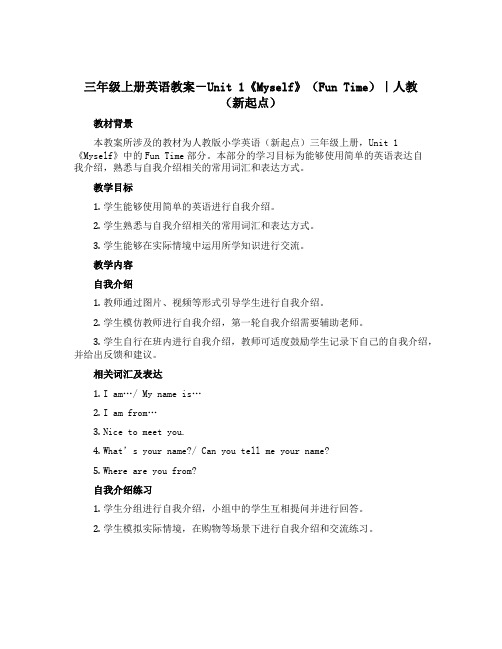
三年级上册英语教案-Unit 1《Myself》(Fun Time)|人教(新起点)教材背景本教案所涉及的教材为人教版小学英语(新起点)三年级上册,Unit 1《Myself》中的Fun Time部分。
本部分的学习目标为能够使用简单的英语表达自我介绍,熟悉与自我介绍相关的常用词汇和表达方式。
教学目标1.学生能够使用简单的英语进行自我介绍。
2.学生熟悉与自我介绍相关的常用词汇和表达方式。
3.学生能够在实际情境中运用所学知识进行交流。
教学内容自我介绍1.教师通过图片、视频等形式引导学生进行自我介绍。
2.学生模仿教师进行自我介绍,第一轮自我介绍需要辅助老师。
3.学生自行在班内进行自我介绍,教师可适度鼓励学生记录下自己的自我介绍,并给出反馈和建议。
相关词汇及表达1.I am…/ My name is…2.I am from…3.Nice to meet you.4.What’s your name?/ Can you tell me your name?5.Where are you from?自我介绍练习1.学生分组进行自我介绍,小组中的学生互相提问并进行回答。
2.学生模拟实际情境,在购物等场景下进行自我介绍和交流练习。
教学过程Step 1 自我介绍介绍1.教师通过图片或者视频展示自我介绍的形式和方式。
2.教师展示自己的自我介绍,并引导学生通过模仿来进行自我介绍。
3.学生分小组进行自我介绍的练习,教师及班内的伙伴进行点评和建议。
Step 2 相关词汇及表达1.教师通过课件展示相关词汇和表达。
2.教师通过示范引导学生使用相关词汇和表达进行自我介绍。
Step 3 自我介绍练习1.学生分组进行自我介绍的练习,小组中的学生互相提问并进行回答。
2.学生模拟实际情境,在购物等场景下进行自我介绍和交流练习。
教学评估教师可以通过以下方式对学生的掌握情况进行评估:1.观察学生的自我介绍是否符合课程目标和相关词汇和表达的要求。
2024年人教版英语初一上unit1课件
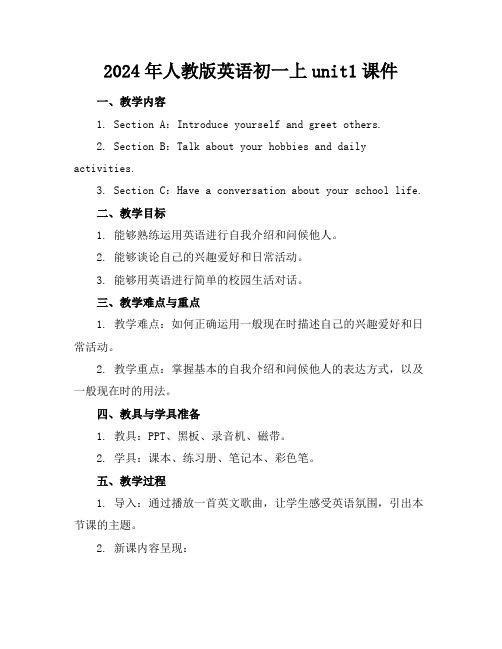
2024年人教版英语初一上unit1课件一、教学内容1. Section A:Introduce yourself and greet others.2. Section B:Talk about your hobbies and daily activities.3. Section C:Have a conversation about your school life.二、教学目标1. 能够熟练运用英语进行自我介绍和问候他人。
2. 能够谈论自己的兴趣爱好和日常活动。
3. 能够用英语进行简单的校园生活对话。
三、教学难点与重点1. 教学难点:如何正确运用一般现在时描述自己的兴趣爱好和日常活动。
2. 教学重点:掌握基本的自我介绍和问候他人的表达方式,以及一般现在时的用法。
四、教具与学具准备1. 教具:PPT、黑板、录音机、磁带。
2. 学具:课本、练习册、笔记本、彩色笔。
五、教学过程1. 导入:通过播放一首英文歌曲,让学生感受英语氛围,引出本节课的主题。
2. 新课内容呈现:a. 教师展示PPT,带领学生学习Section A的内容,让学生跟读并模仿。
b. 学生两人一组进行自我介绍和问候练习。
c. 教师讲解一般现在时的用法,并让学生进行例句练习。
3. 例题讲解:针对Section B的内容,教师给出例题,讲解如何用一般现在时描述兴趣爱好和日常活动。
4. 随堂练习:学生完成练习册上的相关习题,巩固所学知识。
5. 小组活动:学生分组进行对话练习,模拟校园生活场景。
六、板书设计1. Unit 1 My name is…2. 自我介绍和问候他人的表达方式。
3. 一般现在时的用法。
4. 兴趣爱好和日常活动的描述。
七、作业设计1. 作业题目:a. Write a short selfintroduction.b. Describe your hobbies and daily activities using simple sentences.c. Have a conversation with your partner about your school life.答案:b. I like playing basketball and reading books. I usually get up at 6:00 a.m. and go to school at 7:00 a.m.c. A: What do you usually do after school?B: I usually do my homework and then play with my friends.八、课后反思及拓展延伸1. 反思:本节课通过实践情景引入、例题讲解和随堂练习,使学生掌握了基本的自我介绍和问候他人的表达方式,以及一般现在时的用法。
Unit1课时1+课件+2024-2025学年外研版(2024)七年级英语上册++

Activity2 Listen to the radio and find out what it is mainly talking about.
Listen to the radio and choose the main idea.主旨,要点 a Junior high is fun for new students. b New junior high students face problems c There are many activities at junior high.
I have a problem. It’s hard to …Can you give
me some advice?
Useful expressions 1. ..is a problem for me. 2.It makes me feel ... 3.What are some solutions for?
Activity8
Learn and practice.
Talk about how Zhang Wen describes his problems
It’s hard to plan my time.
State the problem.
There are more subjects and more homework. I also want to join some clubs.
problem. For example, It's hard to plan my time. Then we can provide more details. For example, There are
so many tasks.
Activity8
小学英语四年级上册Unit1教案:谈论自己的爱好
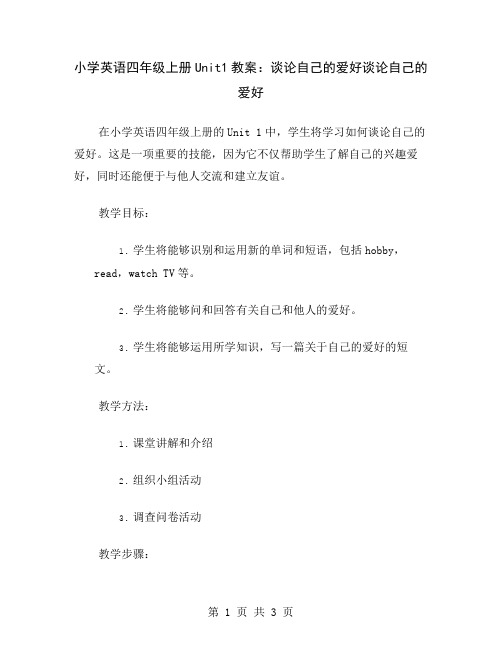
小学英语四年级上册Unit1教案:谈论自己的爱好谈论自己的爱好在小学英语四年级上册的Unit 1中,学生将学习如何谈论自己的爱好。
这是一项重要的技能,因为它不仅帮助学生了解自己的兴趣爱好,同时还能便于与他人交流和建立友谊。
教学目标:1.学生将能够识别和运用新的单词和短语,包括hobby,read,watch TV等。
2.学生将能够问和回答有关自己和他人的爱好。
3.学生将能够运用所学知识,写一篇关于自己的爱好的短文。
教学方法:1.课堂讲解和介绍2.组织小组活动3.调查问卷活动教学步骤:教师将开始课程时用图片或实物向学生介绍新单词"hobby",并与他们分享自己的爱好。
教师还会让学生分享他们自己的爱好,为下一步的活动做好铺垫。
Step 2:组织小组活动将学生分成几组,每组互相介绍自己的爱好。
老师可以为每个小组提供一张爱好卡片,上面列出了一些常见的爱好,例如:reading、playing sports、listening to music、drawing等。
学生可以在小组内轮流使用这些卡片,互相介绍自己的爱好,并找到相同的兴趣爱好。
Step 3:调查问卷活动教师可以给学生发放一份调查问卷,让他们在课堂上去调查其他同学的爱好。
学生可以用英语进行交流,并记录下调查结果。
教师可以在课堂结束时收集反馈结果,并与学生们分享一下调查结果。
Step 4:撰写短文对于喜欢写作的学生,教师可以指导他们写一篇英文短文,表述自己的爱好。
教师应该帮助学生使用正确的语法和词汇,并提供一些范文供学生参考。
在结束课程前,教师应该总结一下本课程中学到的新单词和短语,并鼓励学生积极参与课堂活动,发掘自己的兴趣爱好。
在学习英语的过程中,交流和表达是非常重要的,尤其是表述自己的爱好。
因此,教师应该鼓励学生多加练习,提高英语语言表达能力。
结语:本节课教学目标是让学生谈论自己的爱好,通过小组活动、调查问卷活动和写作等多种方式,让学生培养英语口语和写作技能。
Unit 1 单元话题满分范文必背-2023-2024学年八年级英语上册
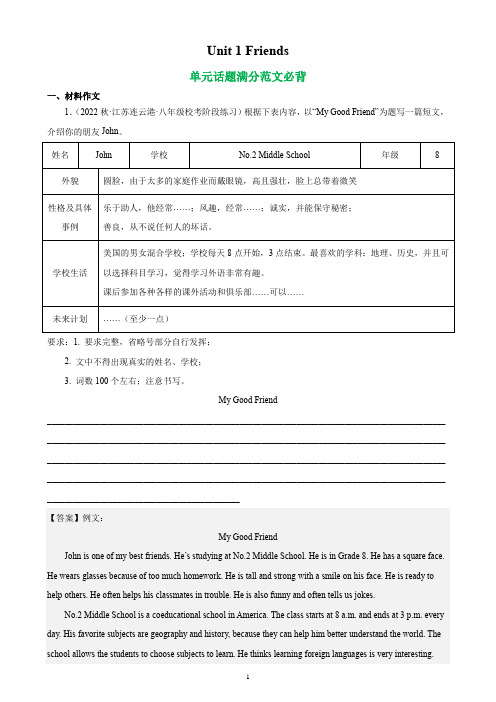
Unit 1 Friends单元话题满分范文必背一、材料作文1.(2022秋·江苏连云港·八年级校考阶段练习)根据下表内容,以“My Good Friend”为题写一篇短文,要求:1. 要求完整,省略号部分自行发挥;2. 文中不得出现真实的姓名、学校;3. 词数100个左右;注意书写。
My Good Friend___________________________________________________________________________________________ ___________________________________________________________________________________________ ___________________________________________________________________________________________ ___________________________________________________________________________________________ ____________________________________________【答案】例文:My Good FriendJohn is one of my best friends. He’s studying at No.2 Middle School. He is in Grade 8. He has a square face. He wears glasses because of too much homework. He is tall and strong with a smile on his face. He is ready to help others. He often helps his classmates in trouble. He is also funny and often tells us jokes.No.2 Middle School is a coeducational school in America. The class starts at 8 a.m. and ends at 3 p.m. every day. His favorite subjects are geography and history, because they can help him better understand the world. The school allows the students to choose subjects to learn. He thinks learning foreign languages is very interesting.The school has all kinds of after-school activities and clubs, such as basketball club, art club and so on. One day he wants to visit China. If possible, he also wants to go to the moon.【详解】[总体分析]①题材:本文是一篇记叙文,为材料作文;①时态:时态以“一般现在时”为主;①提示:根据表格中的信息,介绍你的朋友John,可适当添加细节,并突出写作重点。
八年级英语 Module 4 Activities Unit 1 Sports and activities
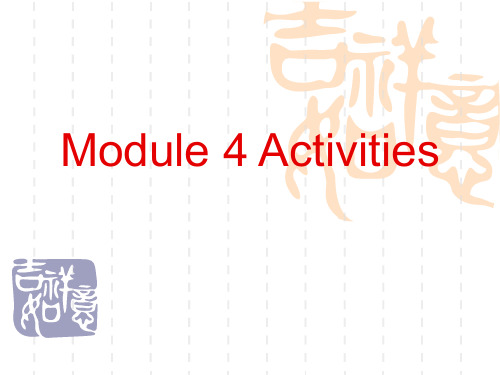
Module 4 Activities
Sports and Activities
What sports are they?
diving (dive v.)
sailing a boat (sail v.)
What sports are they?
riding a bicycle (ride rode ridden)
_H_a_v_eyou_s_ee_n_ this film?We_h_a_v_e_n_’_t s_e_e_nthis film yet.
4. 她给她父母写信了吗?是的。
_H__a_s she_w_r_i_tt_e_n_ _t_o_her parents? Yes, she_h_a_s_.
5. 妈妈在哪里?她出去了。
go to the cinema watch television watch videos listen to the radio listen to music
Review the three forms of some verbs
Infinitive
have do write make go ride run eat swim draw paint play
table tennis
What sports are they?
high jump (jump n. & v.)
tennis
What entertainments are they?
going to the cinema
collecting stamps (collect v.)
- 1、下载文档前请自行甄别文档内容的完整性,平台不提供额外的编辑、内容补充、找答案等附加服务。
- 2、"仅部分预览"的文档,不可在线预览部分如存在完整性等问题,可反馈申请退款(可完整预览的文档不适用该条件!)。
- 3、如文档侵犯您的权益,请联系客服反馈,我们会尽快为您处理(人工客服工作时间:9:00-18:30)。
d g h a f b c e
a. After breakfast she hops and sings and watches TV. b. At 11:45 she goes back to sleep. c. She says, “ I like to hop and sing every day.” d. One day Grasshopper gets up at 10:00. e. She gets dressed and eats breakfast.
d c e a b
c f a e b g d
a. Grasshopper opens one eye and asks, “What time is it ?” b. Grasshopper sits up and smiles. c. Ant walks home at lunch. d.“Yes,” says Ant, “but you don’t have any food.”
Байду номын сангаасThe Ant and
the Grasshopper
ant
grasshopper
Ant lives next to Grasshopper. Ant says, “I like to work and go to school every day.” Every day Ant gets up at 7:15. She finds food before school. She reads and writes. After school she plays soccer. Ant works and works. Grasshopper doesn’t like to work.
读故事
圈出动词的第三人称单数形式。
One day Grasshopper gets up at 10:00. She says, “ I like to hop and sing every day.” She gets dressed and eats breakfast. After breakfast she hops and sings and watches TV. At 11:45 she goes back to sleep.
e. Ant says, “It’s 12:45.” f. She sees Grasshopper and says,“Hello!” g. “Is it time for lunch ?”she asks.
d a f b e c
a. “Can I eat some of your food ?” She asks. b. Grasshopper says, “After lunch , I can work.” c. After lunch Grasshopper hops and sings and works! d. Grasshopper looks at Ant’s food. e. Ant gives Grasshopper some food. f. Ant says , “I work every day .You hop and sing and play.”
读故事
圈出动词的第三人称单数形式。
Grasshopper looks at Ant’s food. “Can I eat some of your food ?” She asks. Ant says , “I work every day .You hop and sing and play.” Grasshopper says, “After lunch , I can work.” Ant gives Grasshopper some food. After lunch Grasshopper hops and sings and works!
1.Where does Ant live? 2. What does Ant do every day? 3. What time does Ant get up? 4. What does Ant do after school? 5. Does Ant like to work?
next to Ant lives _________Grasshopper. work Ant says, “I like to ______and go to school _______________ every day.” gets up Every day Ant _________at 7:15. She __________before school. finds food She _______and reads _______. writes plays soccer After school she____________. Ant works and works. doesn’t like to work Grasshopper___________________.
and ______ sings and ______! works
读故事
圈出动词的第三人称单数形式。
Match the story
a. She finds food before school.
b. After school she plays soccer. c. Ant works and works.
读故事
圈出动词的第三人称单数形式。
Ant walks home at lunch. She sees Grasshopper and says,“Hello!” Grasshopper opens one eye and asks, “What time is it ?” Ant says, “It’s 12:45.” Grasshopper sits up and smiles. “Is it time for lunch ?”she asks. “Yes,” says Ant, “but you don’t have any food.”
1.How does Ant help Grasshopper? 2. Does Grasshopper work after lunch?
at Ant’s food. Grasshopper looks _______ “Can I eat some of your food ?” She asks. work Ant says , “I _____every day.You hop and _____ sing and _____ play .” _____ Grasshopper says, “After lunch , I can work.” some food Ant gives Grasshopper________. After lunch Grasshopper ______ hops
1. What does Ant do at lunch? 2. What time does Ant see Grasshopper?
walks home Ant _____________at lunch. She sees Grasshopper and says,“Hello!” opens one eye Grasshopper ______________and asks, “______________ What time is it ?” Ant says, “It’s 12:45.” sits up Grasshopper _________and______. smiles lunch ?”she asks. “Is it time for ________ “Yes,” says Ant, “but you don’t have any food.”
One day Grasshopper ________at gets up 10:00. hop and ______ sing She says, “ I like to _____ every day.” gets dressed eats breakfast She _____________and______________. After breakfast she hops and sings and____________. watches TV At 11:45 she goes back to sleep.
1. What time does Grasshopper get up? 2. What does Grasshopper like to do? 3. What does Grasshopper do after breakfast? 4. What time does Grasshopper sleep?
d. Ant lives next to Grasshopper.
e. Grasshopper doesn’t like to work. f. She reads and writes. g. Ant says, “I like to work and go to school every day.” h. Every day Ant gets up at 7:15.
